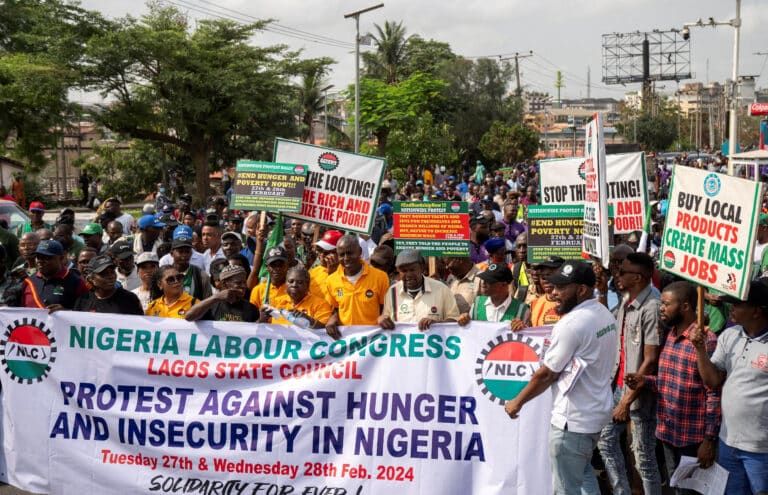
Protesters in Nigeria are weary of the country's poor leadership and skyrocketing expenses. Thousands of people are demonstrating against corrupt officials, rising living expenses, and bad government in the most populous country in Africa.
Pumping their hands in the air and singing songs to entice more people to come alongside them, the few hundred protestors carried signs criticizing the rising cost of living and the high cost of food as they passed through the neighborhood's residential neighborhoods.
Joining the 10-day protests with the hashtag ; #EndBadGovernanceInNigeria with over tens of thousands of citizens from the most populous country in Africa. Protesters against poor government, corruption, and the skyrocketing cost of living that has left countless Nigerians in financial ruin have called for days of mass street protests to start on 1st August. The demands made by the demonstrators total 19.
In certain regions of the nation, such the northern states of Kano and Yobe, demonstrators set fire to vehicles, prompting authorities to enforce curfews. As demonstrators dispersed in the nation's capital, Abuja, gunshots were audible and the police responded with tear gas shells.
The Nigerian director of rights organization Amnesty International reported on Friday morning that over 300 protestors had been detained and at least 13 demonstrators had died. We are asking the government to "cut school fees to make the nation comfortable for students." People [in government] who got the free schooling came into power and revoked free education.
A policy prohibiting students from conducting business out of their dorms was implemented by Unilag concurrently with an increase in tuition prices. It has prevented young people who were already at risk of financial hardship from getting the money they need.
Based to the Nigerian Bureau of Statistics, food inflation in Nigeria is currently at 40%, the highest level in almost thirty years, and unemployment is still rising. Kidnappings, terrorism, and banditry are widespread throughout the nation, even the capital city of Abuja, thus financial fragility is not the main problem.
Much of Nigeria's population now considers basic necessities to be a luxury, and despite Nigeria being one of the world's top oil exporters, mysterious fuel shortages occur every other week. Government attempts to support the naira through policies and coercive measures have not stopped it from declining.
Students find it especially difficult because many of them have trouble affording textbooks or school fees. Things became worse in February when the top power users lost their access to an electricity subsidy.
Due to their high electricity costs, some universities—which are generally big users of electricity—have been cut off from the national grid, forcing students to discover alternate ways to complete their coursework in the dark. Due to the complicated requirements required to obtain it, many people who are on the verge of dropping out have found little assistance from the government's higher education loan plan.
Growing discontent with a badly managed government that took office on a shaky electoral mandate is what gave rise to the protests. A litany of complaints includes ongoing hunger, rising unemployment, and the government's lack of accountability for forcing the populace to endure a debilitating austerity program while the ruling class lives in luxury. This merely demonstrates the government's inability to effectively handle the problem and its responsibility for maintaining law and order as opposed to just regime protection.
Government cut off from the real world In the weeks before the protests began, the Nigerian government made an effort to quell them. In an effort to placate the populace and buy more time for the Tinubu administration to fulfill its electoral pledges, the government held meetings with influential traditional leaders.
This week, it increased the minimum salary from 30,000 to 70,000 naira in an attempt to quell the protest. It also promoted awards costing billions of naira to young Nigerians and jobs in the oil industry of the nation. "There's something unusual about this demonstration. It is a part of the current African youth movement's struggle for survival over an aging and failing political class. According to a proverb, "those who are down fear no fall." Nigerians are worn out.
Upvoted. Thank You for sending some of your rewards to @null. Get more BLURT:
@ mariuszkarowski/how-to-get-automatic-upvote-from-my-accounts@ blurtbooster/blurt-booster-introduction-rules-and-guidelines-1699999662965@ nalexadre/blurt-nexus-creating-an-affiliate-account-1700008765859@ kryptodenno - win BLURT POWER delegationNote: This bot will not vote on AI-generated content